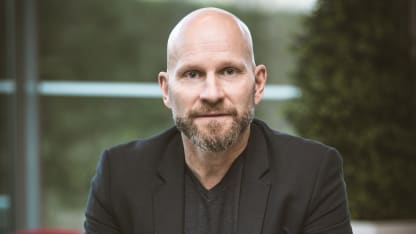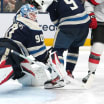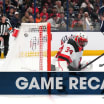Pierre-Luc Dubois and Nick Foligno live different lives, but there's one time of the evening where they can relate -- when the yawns start coming in the evening hours.
The 21-year-old Dubois might be watching binge-watching shows when his body starts telling him it's time to go to sleep for the night.
It's a little different for Foligno. A married 31-year-old with three kids, the Blue Jackets captain might be chatting with his wife Janelle after putting their children to bed when he starts to be overcome by the urge to hit the hay.
The science of sleep helps Blue Jackets get ahead
Team-wide sleep study has helped Columbus with recovery efforts

© Jamie Sabau
In both cases, though, the Columbus teammates now know what the best course of action is, even if it's not always the easiest one.
Give in. Go to bed.
For each, that was the take-home message after spending time over the past year with Henri Tuomilehto. The Finnish doctor and his staff put members of the team through individualized sleep studies a year ago, then delivered recommendations for each player to improve based on his style of sleep and any issues he may face.
In the end, the advice often boiled down to some common-sense suggestions -- players should get more sleep, which optimizes letting the body go through the natural recovery that takes place during the sleeping hours.
The other big piece of advice? Don't fight your body. If it's telling you to go to sleep, there's probably a reason.
"You wouldn't think you'd have to learn this, but as soon as you are tired, whether it's 9:30 or 10:30 or 11, you need to go to bed," Dubois said. "You'd think I'd know that, but I guess I didn't.
"Sometimes you start watching 'Love Island' and you don't want to go to bed because you are like, 'Oh, what is going to happen next?' You stay up for another hour and then you're not tired anymore. It's just being mature about it."
Learning about the importance of sleep -- and allowing his team members to have any sleep disorders they may have diagnosed -- is why general manager Jarmo Kekalainen brought his countryman Tuomilehto into the fold before the start of last season.
A former professional athlete himself, Tuomilehto is the founder and medical director of Coronaria Sleep Clinics, the largest sleep clinic network in Finland. While Tuomilehto has worked with numerous teams and around 1,000 in different sports in Europe, including members of the Finnish Olympic team, the doctor believes Columbus is the first-ever professional sports franchise to test its entire team via a full sleep study.

"We always worry about the equipment, the facilities, the time that they're at the rink," Kekalainen said. "And then at the same time, at least one-third of the 24-hour day should consist of sleeping, and we never do anything about it."
"I figured we should because it's at least one-third of your day. It's a significant amount and percentage, so let's do something about it."
To test each athlete, Tuomilehto and his team spent almost a week in Columbus last fall, performing a polysomnography on 20 members of the Blue Jackets team. A polysomnography measures brain waves, breathing, movement, blood pressure and other factors during a person's sleep.
The players were wired before heading home -- Foligno admitted he felt "like a ticking time bomb" when he was wired -- then sent for a full night's sleep. The most important factor measured was each player's brain waves, as recorded by electroencephalography, which is used to demonstrate the quality of sleep, possible sleep deprivation, the number of awakenings and arousals from sleep (which mostly happen without person knowing them), and what caused those awakenings and arousals.
The data was sent back to Finland and analyzed by Tuomilehto's staff, then the results were relayed to the players. To Tuomilehto, sleep is a skill, and each person's unique profile can teach them how to optimize their experience.
"We get the result, and then after that I can really show them how it goes, what the quality of their sleep is," said Tuomilehto, who has spent 15 years in sleep research. "I can see if they are sleep-deprived. Many times the players think they are doing fine, but when we do this, I can see from the brain they are sleep-deprived. Either they don't sleep enough of the quality is bad. So I can show them -- it's black and white."
So why is it so important? Ninety to 95 percent of the recovery a body undergoes after expending its energy throughout a given day takes place during sleep, so you immediately see why it's important for athletes to sleep the right way.
In addition, there are three things that sleep enhances a person -- energy, memory and learning -- which are all important in the athletic trade. Full recovery time also can mean the potential for fewer injuries because muscles and joints are operating at their full capacity.
"When I start with the guys, I always have a card in my hand, and it says 50 percent on my card," Tuomilehto said. "I ask them, 'Who wants this card? It provides you a 50 percent less possibility of getting injured this season.' Everybody is going to want it. I say, 'It's very easy, you just need to sleep one hour more and you (have a) 50 percent less probability to get injured.' So it's big."
Tuomilehto checked back in with the team last January then returned during this autumn's training camp to consult with more players, even taking a trip to Cleveland to meet with a number of the team's prospects with the Monsters.
He knows most pro teams go through similar drills and schedules on a given practice day, with the players at the rink in the morning and early afternoon hours before heading home. It's what they do in that time at away from the rink that is most important, and as Dubois said, it boils down to being smart with their time.
While Tuomilehto and his staff are able to diagnose any sleep disorders that may exist and then create a plan to treat them, there is one most common thing a player can do to improve his sleep experience and thus his recovery.
"There's nothing you can do better than sleep more," Tuomilehto said. "Last year when I was here, there was only one player that slept more than eight hours. Now today, everybody sleeps more than eight hours. That's the biggest change over one year. We aimed for that, and on average the team has increased their sleep by one hour, so I think that's the biggest thing you can do.
"It sounds easy, but people don't do it."
They might now, though, at least on the Blue Jackets roster. Considering the team plays 82 games over a six-month span -- and flies across the U.S. and Canada, from time zone to time zone, to do so -- there's no perfect plan.
It can be especially tough for someone like Foligno, as the three kids under one roof also require time and attention. While Foligno has joked with his wife that Tuomilehto has mandated he get that sleep -- doctor's orders, after all -- the reality is he's done his best to incorporate the advice into his busy life.
And at the end of the day, he's seen a benefit with his body, which can't help but translate to the ice.
"It's amazing what it did for a lot of guys -- myself included -- just with opening our eyes up to how we can sleep a little more optimally," the captain said. "It's helped. You have to take advantage of the sleep that you can get and not feel bad about it, and I've taken that to heart."

















